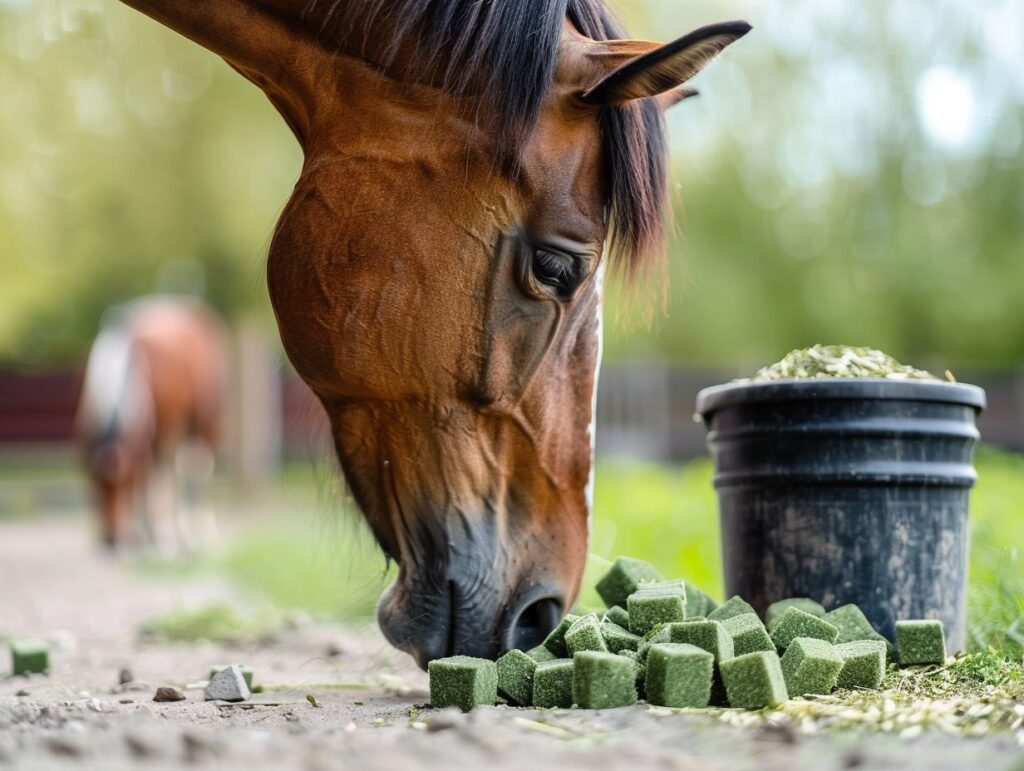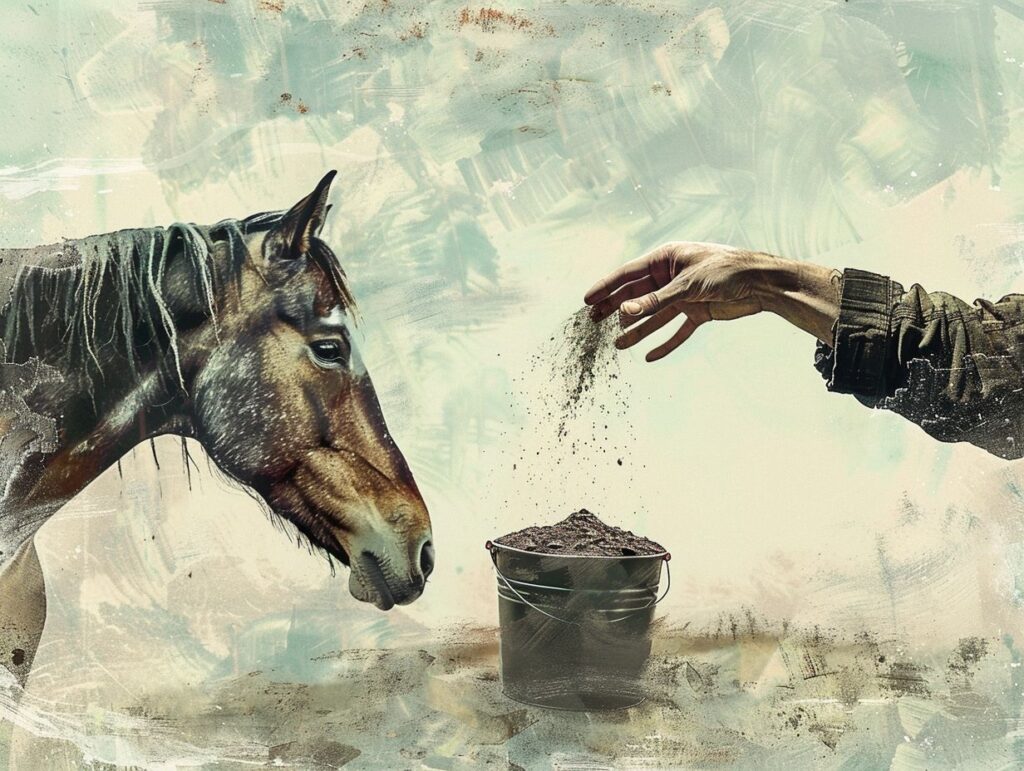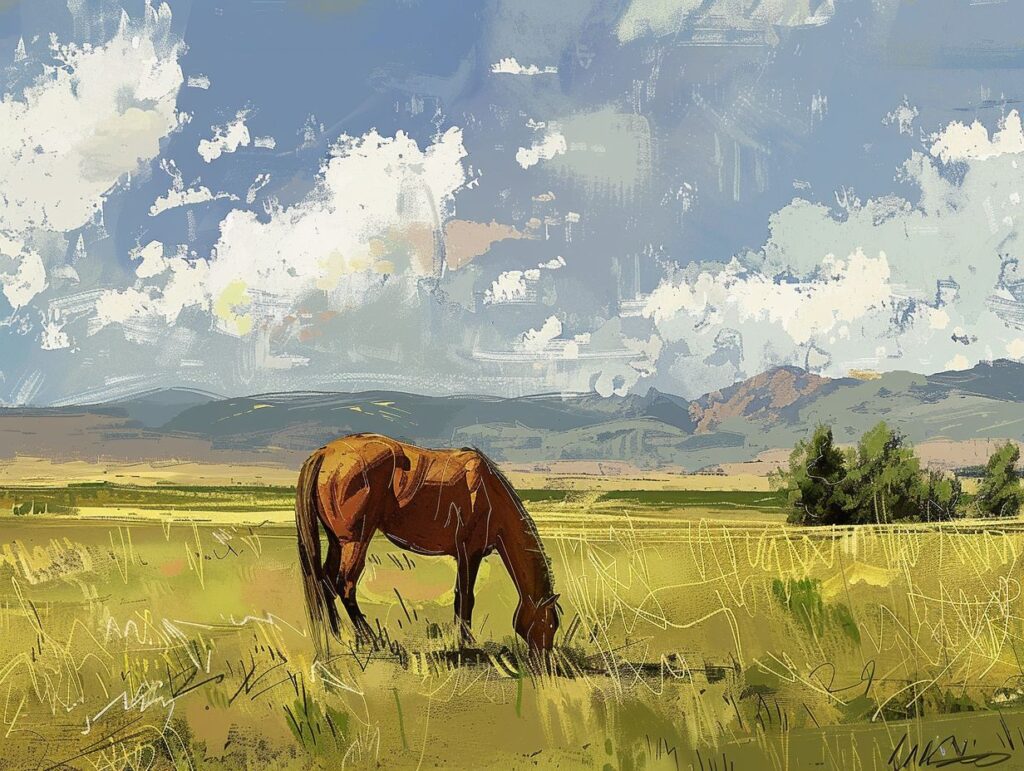As our beloved horses age, their dietary needs change, requiring special attention and care.
We discuss the unique dietary requirements of senior horses and the importance of high-quality forage in their nutrition.
We also explore the benefits of supplementing their diet with alfalfa cubes, comparing them to other feed options like senior feed and beet pulp.
Discover how to incorporate alfalfa cubes into your older horse’s diet and explore potential alternatives to provide them with the best nutrition possible.
Key Takeaways:
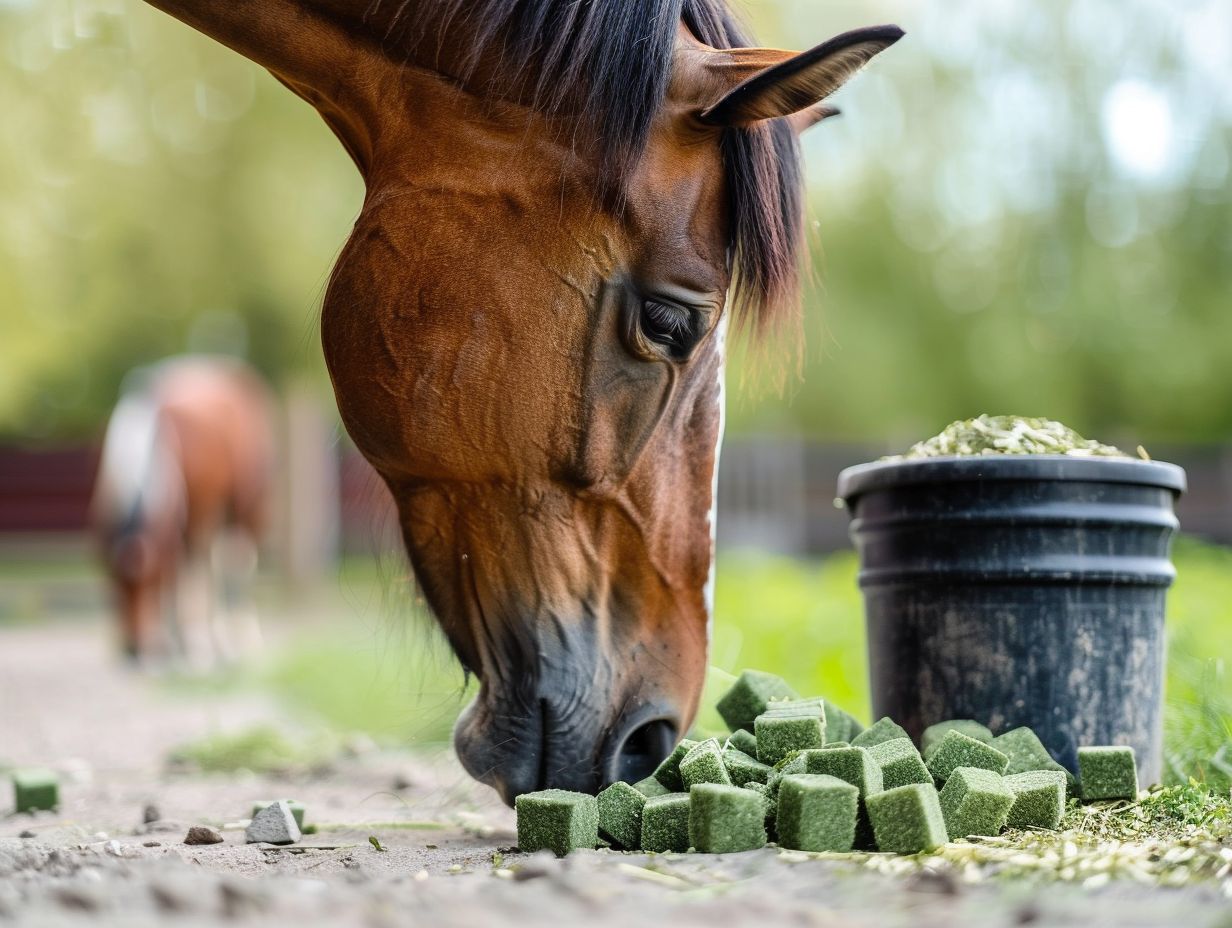
- Senior horses have unique dietary needs that require high-quality forage, making alfalfa cubes a beneficial supplement.
- Alfalfa cubes can be easily incorporated into a senior horse’s diet by gradually introducing them and monitoring for any digestive issues.
- While alfalfa cubes may be a good option for older horses, it’s important to also consider other nutritious alternatives and consult with a veterinarian for personalized feeding recommendations.
Understanding the Unique Dietary Needs of Senior Horses
Senior horses possess distinct dietary requirements as a result of various factors, including the aging process, dental health considerations, and alterations in metabolic functions. A comprehensive understanding of these specific needs is imperative in the development of a nutritionally sound diet regimen that promotes the overall health and vitality of these equines.
Challenges such as dental issues can impede the ability of senior horses to properly chew and digest their food, potentially leading to deficiencies in essential nutrients. With advancing age, these equines may also encounter diminished efficiency in nutrient absorption, necessitating meticulously tailored feeding programs that ensure the provision of sufficient quantities of vitamins, minerals, and proteins.
The gradual deceleration of metabolism in aging horses emphasizes the significance of weight management within their dietary plans. Customized feeding schedules that accommodate these age-related physiological changes assume a critical role in preserving the health and longevity of senior horses.
Considerations for Senior Horse Nutrition
Nutrition significantly influences the health and vitality of senior horses, playing a critical role in their overall well-being. When addressing senior horse nutrition, it is imperative to go beyond mere feed intake considerations and delve into factors such as digestibility, nutrient absorption, and the utilization of specialized feeds tailored to meet their specific requirements.
As horses advance in age, their digestive systems may experience a decline in efficiency, underscoring the importance of providing easily digestible feeds that are rich in essential nutrients, including proteins, vitamins, and minerals. Tailored diets designed for senior horses often incorporate ingredients that promote joint health and muscle maintenance, addressing prevalent age-related concerns.
The implementation of a comprehensive and balanced feeding regimen, coupled with regular veterinary assessments, is crucial for optimizing the overall well-being of older equines and ensuring they receive the requisite nutrients for sustained health and longevity.
Importance of High-Quality Forage
The foundation of a senior horse’s diet lies in high-quality forage, as it provides essential nutrients, fiber, and roughage crucial for optimal digestive function and overall health. The quality and variety of forage offered to senior horses have a significant impact on their well-being and longevity.
By prioritizing the provision of superior forage options to senior horses, horse owners can ensure that their equine companions receive the necessary fiber content to facilitate proper digestion and nutrient absorption. Sufficient fiber in the diets of senior horses not only fosters a healthy gut but also aids in the prevention of digestive issues such as colic and ulcers.
High-quality forage plays a pivotal role in sustaining a senior horse’s vitality and energy levels by supporting efficient metabolism and overall well-being.
Benefits of Supplementing with Alfalfa Cubes
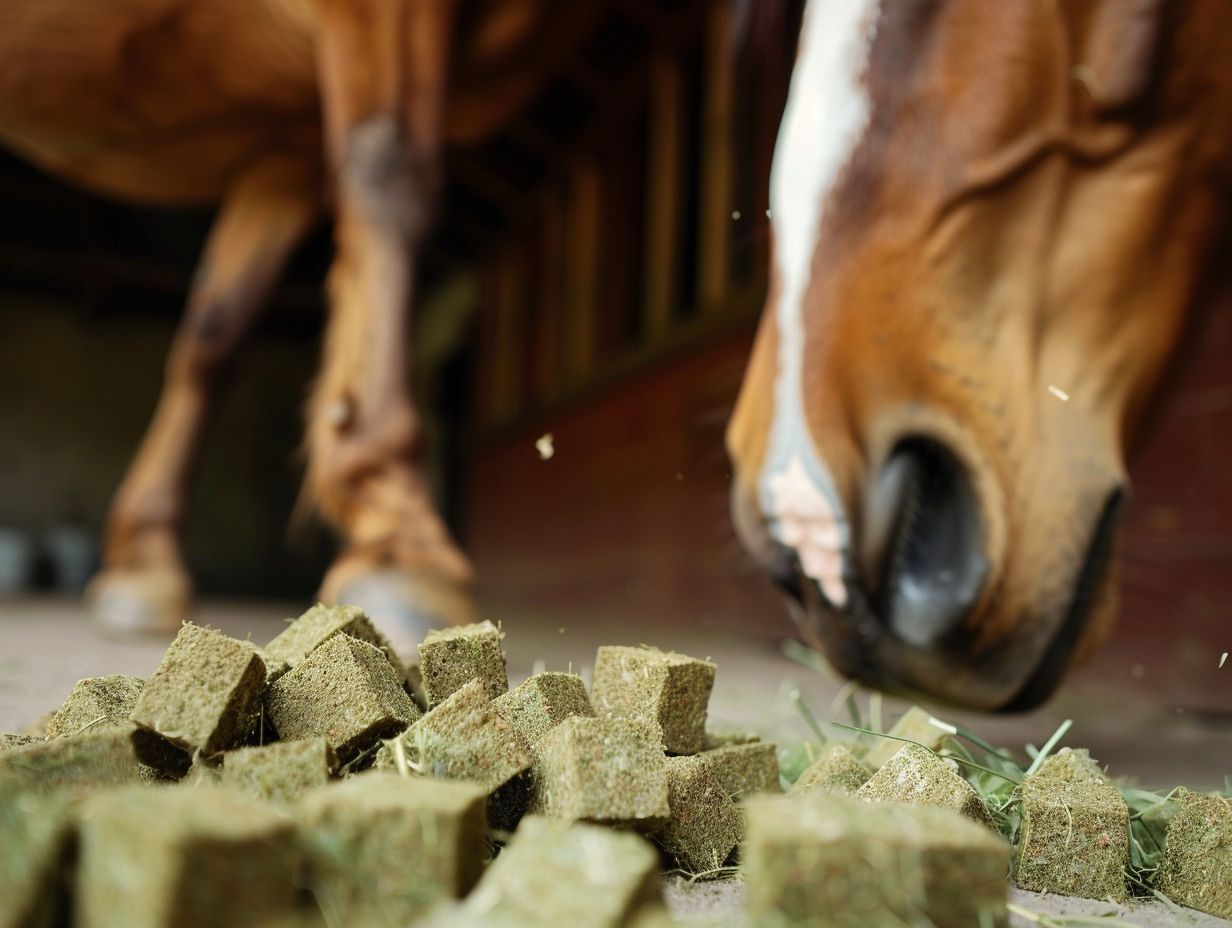
Enhancing the dietary regimen of senior horses by incorporating alfalfa cubes can yield a plethora of advantages, encompassing heightened protein intake, enhanced digestibility, and improved body condition. Alfalfa cubes present a practical and nutrient-dense option to cater to the nutritional requirements of aged equines.
These cubes boast not only a superior quality of protein but also a rich assortment of essential vitamins and minerals essential for preserving the well-being and vigor of mature horses. The easily digestible composition of alfalfa cubes renders them an optimal selection for elderly equines grappling with dental complications or delicate digestive systems. Additionally, the fiber content inherent in alfalfa cubes promotes superior gastrointestinal health and can facilitate weight management for horses encountering challenges in maintaining an optimal body composition.
Choosing the Right Feed for Senior Horses
The selection of an appropriate feed for senior horses is essential to meet their unique nutritional needs and promote overall health. Factors such as nutrient composition, digestibility, and specific dietary requirements should be taken into consideration when choosing a feed to ensure optimal well-being.
Nutrient balance plays a critical role in the nutrition of senior horses, as it is crucial to provide them with essential vitamins, minerals, and proteins. Selecting feeds that are easily digestible can assist aging horses, especially those with potential digestive issues.
Tailoring the choice of feed to the individual horse’s dietary requirements, whether they need additional calories for energy or specific nutrients for joint health, can contribute to their overall well-being and longevity.
By carefully assessing these considerations, horse owners can make informed decisions regarding the most suitable feed options for their senior equine companions.
Comparing Alfalfa Cubes, Senior Feed, and Beet Pulp
When contemplating feed options for senior horses, a thorough comparison of the advantages and disadvantages of alfalfa cubes, senior feed, and beet pulp can facilitate the selection of the most appropriate choice based on the horse’s nutritional requirements, physical condition, and dietary preferences. Each of these feed options presents distinct benefits that can positively impact the overall health of aging horses.
Alfalfa cubes stand out for their high protein and calcium content, rendering them ideal for preserving muscle mass and bone strength in senior equines. Conversely, senior feed is meticulously formulated to fulfill the nutritional needs of older horses, offering a harmonious combination of fiber, vitamins, and minerals.
Renowned for its digestibility and fiber composition, beet pulp can play a pivotal role in averting common digestive issues among aging horses, such as colic and impaction. Evaluating the nutrient profiles and digestibility of these feed options is paramount in customizing a senior horse’s diet to promote their welfare and longevity.
Feeding Alfalfa Cubes to Older Horses
Incorporating alfalfa cubes into the diet of older horses necessitates a meticulous approach to ensure a proper nutrient balance, control of feed intake, and maintenance of digestive health. It is imperative to have a comprehensive understanding of how to introduce and supervise the inclusion of alfalfa cubes in the feeding regimen of senior horses to optimize their nutritional advantages and promote their overall health.
The gradual introduction of alfalfa cubes into the diet of an older horse is paramount. Commence by offering small quantities and gradually increasing the amount over a span of one to two weeks to allow the horse’s digestive system to acclimate.
It is crucial to regularly monitor the horse’s feed consumption and observe any changes in behavior, such as heightened thirst or diminished appetite. Portion sizes should be adjusted according to the individual horse’s requirements, taking into account factors like weight, level of activity, and any pre-existing health conditions.
Vigilantly monitoring the horse’s general health and digestive processes is essential to confirm that the alfalfa cubes are being tolerated well and delivering the intended nutritional support.
How to Incorporate Alfalfa Cubes into Your Horse’s Diet
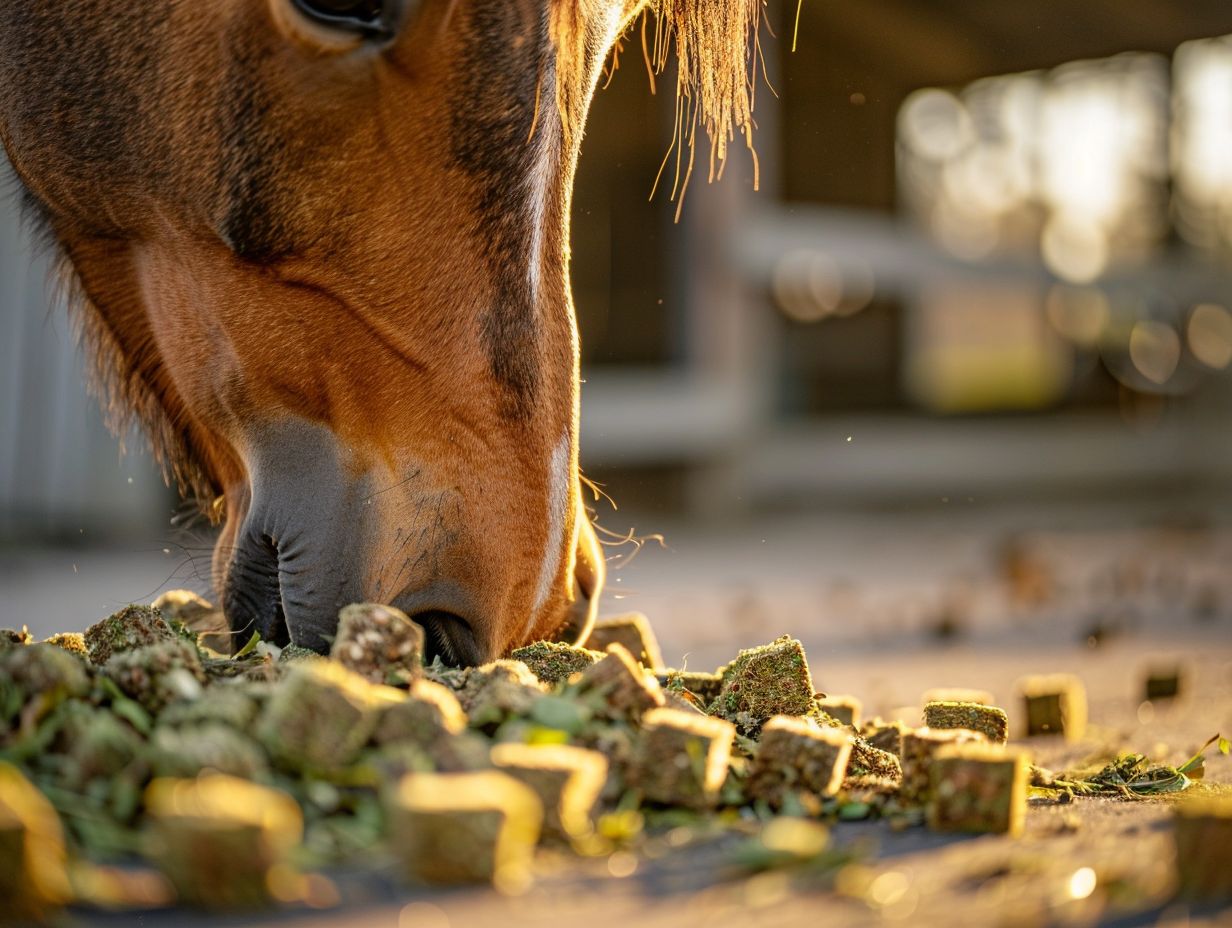
Incorporating alfalfa cubes into the diet of a senior horse can serve as a beneficial nutritional approach when executed appropriately. By methodically introducing alfalfa cubes, closely monitoring the horse’s reactions, and making necessary adjustments to the feeding regimen, one can enhance the overall health and welfare of the aging equine companion.
Initiate the process by replacing a small portion of the horse’s regular forage with alfalfa cubes and observing their response to this new dietary element. It is imperative to closely monitor the horse’s digestive system for any indications of discomfort or digestive disturbances.
If the horse adapts smoothly, gradually augment the quantity of alfalfa cubes over a span of several days, ensuring constant access to fresh water. Assess the horse’s energy levels, coat condition, and general demeanor to evaluate the effects of the dietary modification. It is essential to acknowledge that each horse is distinct, necessitating a customized feeding regimen tailored to the individual requirements and reactions of the horse.
Potential Alternatives to Alfalfa Cubes
Exploring alternative feed options for senior horses beyond alfalfa cubes can provide a diverse and balanced diet that meets their nutritional requirements and promotes overall health. Considering different nutrient sources and feed varieties can help tailor the feeding regimen to suit the individual needs of aging equines.
Incorporating hay pellets, beet pulp, senior horse feeds, and soaked hay cubes into a senior horse’s diet offers a variety of textures and flavors that can stimulate their appetite and ensure they receive a wide range of essential nutrients. Including sources of omega-3 fatty acids like flaxseed or chia seeds can support joint health and aid in maintaining a shiny coat.
By rotating between these different feed options and supplementing with mineral salts or probiotics as needed, senior horses can enjoy a well-rounded diet that supports their overall well-being.
Exploring Other Nutritious Options for Senior Horses
Mature equines can derive nutritional benefits from a variety of feed options beyond alfalfa cubes, including beet pulp, senior-specific feed blends, and alternative forage sources. Broadening the selection of nutrient-rich alternatives can contribute to enhancing the dietary diversity and overall well-being of aging horses.
For instance, beet pulp serves as an excellent source of easily digestible fiber and boasts a softer texture that is gentler on the teeth of senior horses. Tailored specifically for the requirements of older equines, specialized senior feeds are composed to deliver well-rounded nutrition, often incorporating additional ingredients for joint support and maintaining controlled levels of starch.
Inclusion of an assortment of forage choices such as timothy hay, orchard grass, or mixed grass can facilitate the replication of horses’ natural grazing behavior while ensuring the intake of vital vitamins and minerals.
Frequently Asked Questions
Are Alfalfa Cubes Good for Older Horses?
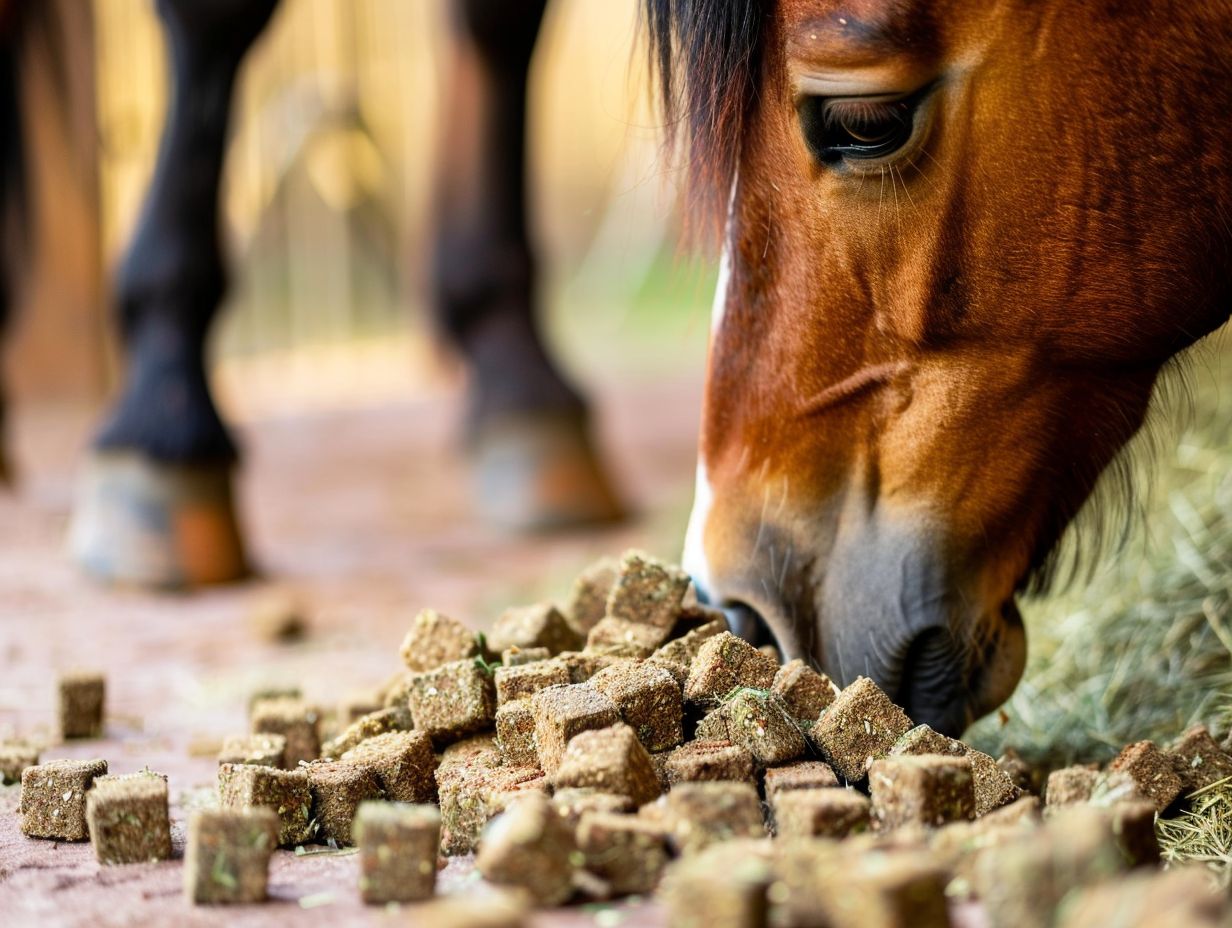
Yes, alfalfa cubes can be a great option for older horses. They are high in protein and easily digestible, making them a good choice for senior horses who may have trouble chewing or digesting other types of forage.
What are the benefits of feeding alfalfa cubes to older horses?
Alfalfa cubes provide a good source of nutrition for older horses, as they are high in protein, calcium, and other essential vitamins and minerals. They can also help maintain weight and muscle mass in older horses who may have trouble maintaining their weight due to dental issues.
How should I feed alfalfa cubes to my older horse?
Alfalfa cubes can be fed in a variety of ways, such as soaked in water, mixed with grain, or fed as a treat. It is important to monitor your horse’s intake and adjust accordingly to avoid any digestive issues. It is also recommended to consult with a veterinarian or equine nutritionist for specific feeding recommendations for your horse.
Can alfalfa cubes be harmful to older horses?
While alfalfa cubes are generally safe for older horses, it is important to monitor their intake and not feed them in excess. Too much protein can be harmful to older horses with certain health conditions, and feeding too many alfalfa cubes can also lead to digestive issues. Moderation is key.
Are there any alternatives to feeding alfalfa cubes to older horses?
Yes, there are other types of forage that can be fed to older horses, such as hay pellets or chopped forage. It is important to consider your horse’s individual needs and consult with a veterinarian or equine nutritionist to determine the best forage option for your horse.
Can I feed alfalfa cubes to my older horse with dental issues?
Alfalfa cubes can be a good option for older horses with dental issues, as they are easier to chew and digest compared to long-stem hay. However, it is important to monitor your horse’s intake and consult with a veterinarian to ensure they are getting enough nutrition and not experiencing any discomfort while eating.
